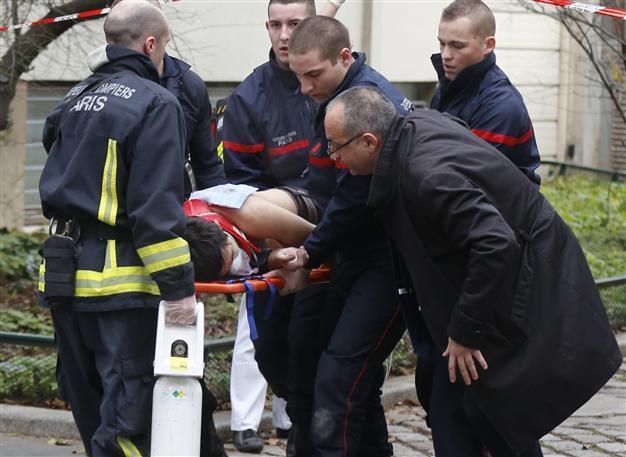12 dead in 'terrorist' attack on French satirical newspaper
PARIS

Firefighters carry a victim on a stretcher at the scene after a shooting at the Paris offices of Charlie Hebdo, a satirical newspaper, January 7, 2015. REUTERS Photo
Heavily armed gunmen shouting Islamist slogans stormed a Paris satirical newspaper office Wednesday and shot dead at least 12 people in the deadliest attack in France in four decades.
Police launched a massive manhunt for the masked attackers who reportedly hijacked a car and sped off, running over a pedestrian and shooting at officers.
Police said witnesses heard the attackers, who were armed with a Kalashnikov and rocket launcher, shout "we have avenged the prophet" and "Allahu akbar" (God is greatest).
Two police were confirmed among the dead and four people were critically injured.
The capital was placed under the highest alert status after the attack on Charlie Hebdo, a satirical weekly that has sparked anger in the past among Muslims for publishing cartoons of the prophet Mohamed.
Television footage showed large numbers of police in the area, bullet-riddled windows and people being carried away on stretchers.
The attack took place at a time of heightened fears in France and other European capitals over fallout from the wars in Iraq and Syria where hundreds of European citizens have gone to fight alongside the radical Islamic State group.
President Francois Hollande, who immediately rushed to the scene of the shooting, described it as a barbaric terrorist attack.
"An act of exceptional barbarism has just been committed here in Paris against a newspaper, meaning (against) the expression of liberty," Hollande said at the scene.
One man who witnessed the shooting said he saw two attackers shooting their way out of Charlie Hebdo at around 11:30 am (1030GMT).
"I saw them leaving and shooting. They were wearing masks. These guys were serious," said the man who declined to give his name.
"At first I thought it was special forces chasing drug traffickers or something. We weren't expecting this. You would think we were in a movie."
Hollande called for "national unity", adding that "several terrorist attacks had been foiled in recent weeks".
Leaders condemn the attack The White House condemned the attack in the "strongest possible terms," while British Prime Minister David Cameron called it "sickening."
"We stand with the French people in the fight against terror and defending the freedom of the press," Cameron said in a message on Twitter.
German Chancellor Angela Merkel condemned the "despicable" attack in a condolence letter to Hollande.
"I was shocked to learn of the despicable attack on the newspaper in Paris," the German leader wrote.
"I would like to express to you and your compatriots in this hour of suffering the sympathy of the German people as well my own sorrow, and convey my condolences to the victims' loved ones."
Wednesday's shooting is one of the worst attacks in France in decades.
In 1995, a bomb in a commuter train attributed to Algerian extremists exploded at the Saint Michel metro station in Paris, killing eight and wounding 119.
The satirical newspaper gained notoriety in February 2006 when it reprinted cartoons of the Prophet Mohammed that had originally appeared in Danish daily Jyllands-Posten, causing fury across the Muslim world.
Its offices were fire-bombed in November 2011 when it published a cartoon of Mohammed and under the title "Charia Hebdo".
Despite being taken to court under anti-racism laws, the weekly continued to publish controversial cartoons of the Muslim prophet.
In September 2012 Charlie Hebdo published cartoons of a naked Mohammed as violent protests were taking place in several countries over a low-budget film, titled "Innocence of Muslims", which was made in the United States and insulted the prophet.
French schools, consulates and cultural centres in 20 Muslim countries were briefly closed along with embassies for fear of retaliatory attacks at the time.
Editor Stephane Charbonnier has received death threats and lives under police protection.
This week's front page featured controversial author French Michel Houellebecq, whose latest book "Soumission", or "Submission," which imagines a France in the near future that is ruled by an Islamic government, came out Wednesday.
The book has widely been touted as tapping into growing unease among non-Muslim French about immigration and the rise of Islamic influence in society.
